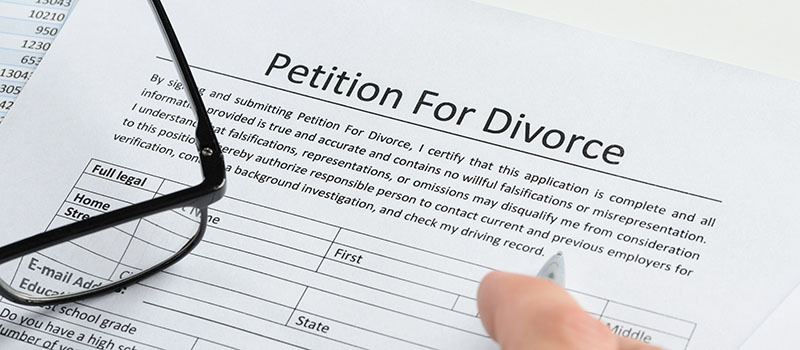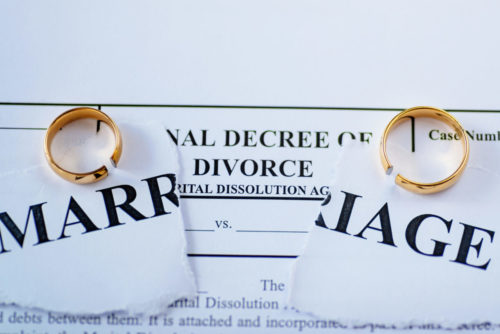
Legal Separation vs. Divorce in Arizona
Some couples in Arizona are not sure that they want to go through with a divorce while others want to remain married but be separated for a variety of reasons. Legal separation is an alternative to divorce for some people. People sometimes decide to seek a legal separation rather than a divorce because of finances, religious concerns, health insurance coverage, or the potential to reconcile at a later time.
If you are thinking about getting a legal separation from your spouse, the family law attorneys at the Schill Law Group can help you to determine whether a separation might be a good choice for you instead of a divorce.
What is the Difference Between Legal Separation and Divorce?
A legal separation has many similarities to divorce in Arizona. In both types of cases, the spouses will have separated their finances and community property and will live apart. Issues of child custody, visitation, child support, and spousal maintenance might also be decided.
However, the main difference between a legal separation and a divorce in Arizona is that people who are legally separated are still married. By contrast, a divorce terminates the marriage.
To get a legal separation, both parties must agree to pursue it. Under A.R.S. § 25-313, if one spouse objects to the legal separation, the court will order the pleadings to be amended to seek a dissolution instead of separation. By contrast, only one spouse has to agree for a divorce case to proceed under A.R.S. § 25-312 as long as the court finds that the marriage is irretrievably broken. Since Arizona is a no-fault state for regular divorces, this means that a divorce can be granted even if only one party wants it.
The legal procedure that is required to get a legal separation or a divorce is very similar. Both will require the filing of a petition. The petitioner will then need to serve the documents on the other party. The respondent will be able to respond to the petition. As long as both parties agree to the legal separation, they will negotiate with each other to try to reach a settlement agreement for the division of property, child custody and visitation, spousal maintenance, and child support.
If there are outstanding legal issues in dispute, they can be litigated in court. Eventually, a decree of legal separation can be issued. Legal separation and divorce cases also have identical residency requirements.
When a couple receives their decree of separation or dissolution, they will no longer have a community property relationship with each other. There will be both financial and physical separation. A legally separated couple will still be married and unable to marry other people, however.

Why Choose Legal Separation Instead of Divorce?
Couples choose legal separation instead of divorce for several reasons. While legal separation will end the financial relationship between the spouses, and they will live apart, they will still be married. Some spouses choose to do this because of health insurance reasons. For example, the spouses might agree to a legal separation when one spouse is on the other’s health insurance policy and is unable to get a separate policy.
Some people choose legal separation because of their religious beliefs. Others might choose legal separation as a trial to see if they truly want to divorce or if reconciliation might instead be possible.
How Long does it Take to Become Legally Separated in Arizona?
Under A.R.S. § 25-329, the waiting period for a legal separation or divorce is 60 days after the petition has been served by the petitioner on the respondent. This is how long it can take if both parties agree to everything, take their required parenting classes, and file all of their documents early.
If a case goes through litigation, however, it can take one year or longer. Cases that are resolved through mediation might take up to four months.
6 Things to Consider When Deciding Between Legal Separation or Divorce.
There are several factors that you should consider when you are trying to decide between legal separation or divorce. Thinking through each of them might help you to determine which process might be a better choice.
1. Your ability to remarry
If you and your spouse agree to a legal separation, you will still be legally married. This means that neither one of you will be able to marry someone else. If you choose to get divorced, either one of you will be legally allowed to get married again. While it might be hard to think about getting married again, you might feel very differently later.
2. Potential for reconciliation
Some couples choose legal separation because they think that it might be possible for them to reconcile later. If you and your spouse are going through difficulties and feel like time apart might be beneficial, a legal separation might be a good option. However, reconciliation will likely take some work and a willingness of both spouses to go to therapy.
If you are both willing to do this, getting a legal separation while you try to work things out can help to resolve some issues during the time that you live apart.
3. Not being emotionally ready for divorce
Some couples need to use legal separation as a step on the way to divorce. For these couples, a legal separation might allow them to work through their emotions until they are prepared for the permanent nature of getting divorced. If you are not emotionally prepared for divorce but know it is something that you will need to face in the future, you might prefer to get legally separated until you are ready.
4. Religious considerations
One of the primary reasons that couples choose to get legally separated instead of divorced is religion. If your religious beliefs do not allow you to go through with a divorce, a legal separation might be an option. However, your spouse will need to agree to a separation.
5. Health insurance
Some couples choose to get a legal separation because one spouse might not have access to insurance on his or her own. For example, if your spouse relies on your health insurance and has medical issues, you might decide to pursue a legal separation so that he or she can maintain his or her health coverage.
If you choose to divorce instead, your spouse will need to find health insurance on his or her own. In some cases, COBRA might allow a spouse to have some time to look for coverage. COBRA coverage can be very expensive, however.
6. Children and legal separation vs. a divorce
Children might find their parents’ legal separation to be just as difficult as if they got divorced. Whether you choose to pursue a legal separation or a divorce, you should expect it to be hard on your children. You and your spouse should keep the best interests of your children in mind in all of your decisions. Never say negative things about each other to your children or in front of them.
If you and your spouse believe that you will be able to reconcile, you can tell your children that you need to live in different places for a while. Your children should be told that the decisions that you make are not their fault and that you and your spouse still love them. If your marriage ultimately fails, your children will have time to get used to the new circumstances and potentially more able to handle your divorce. If reconciliation is not likely, you should be honest with your children. You do not want them to have false hopes that you will reconcile.
Deciding to Move Forward with Divorce, Schill Divorce Attorneys can Help.
Deciding to divorce or separate can be difficult. While you or your spouse might be against the idea of legally separating or getting divorced, it is important to understand that if either of you want to get divorced, it will move forward. Talking to an experienced family law attorney at the Schill Law Group might help you to sort through your thoughts and determine which process might be better for your situation and your family.
If you and your spouse opt for a legal separation, you can always convert it to divorce later.
The decision of whether to pursue a divorce or a legal separation is personal. Seeking the advice of a family law attorney is advisable in either case. To learn more about these different processes, contact the Schill Law Group today to schedule a consultation by calling us at 480.525.8900.








